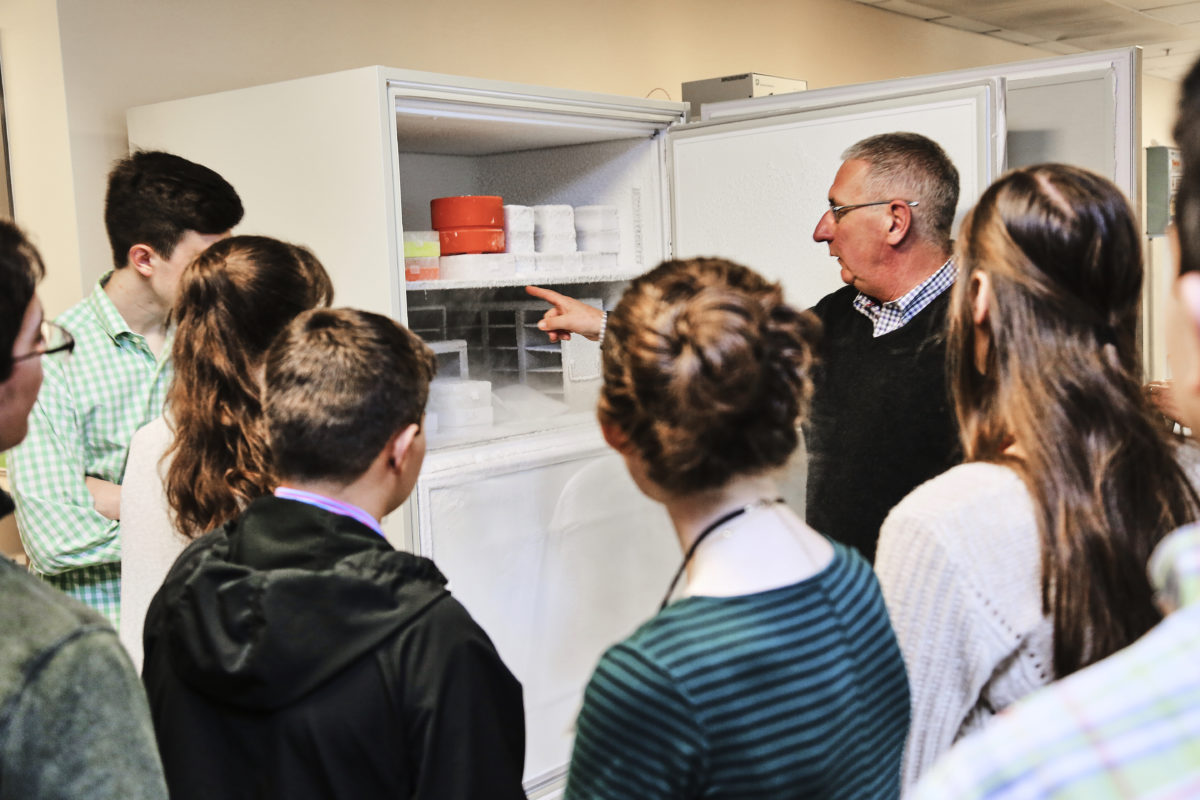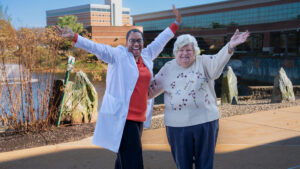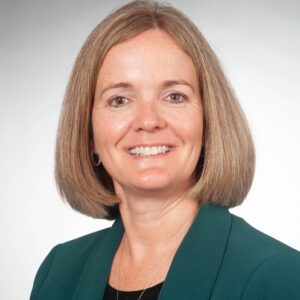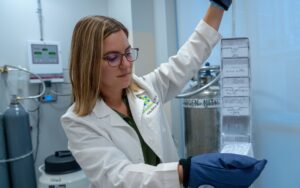High school students can uniquely appreciate the benefits of spell-check. After all, one misspelled word can ruin an otherwise perfect grade on a paper that took days or weeks to write. At a meeting last month with the Young Friends of Christiana Care, Eric Kmiec, Ph.D., director of the Gene Editing Institute at the Helen F. Graham Cancer Center & Research Institute, likened the science of gene editing to using spell-check on human cells. Just as students cut, paste and change letters to perfect their assignments, he explained, gene scientists delete, insert or replace a wrong letter in the genetic code to prevent or cure physiologic abnormalities.
“Biomedical research using gene editing promises exciting technological implications to treat patients beyond cancer in such fields as fuel, agriculture and transplant surgery,” Dr. Kmiec told the group of high school students. “You are hitting high school, college and medical school exactly when this revolutionary progress we’re seeing in gene editing will impact cancer and genetic research. I wish I had the tools that are available to you today even five years ago.”
The visit to the Graham Cancer Center, which included a tour of Dr. Kmiec’s pioneering laboratory, was the latest in a series of meetings of the Young Friends, which launched in 2016. The high school students, who are children and grandchildren of Christiana Care board, trustees, Junior Board and Leadership Council members, gather quarterly for an inside look at health system programs and to garner valuable insight about leadership, community service and philanthropy.
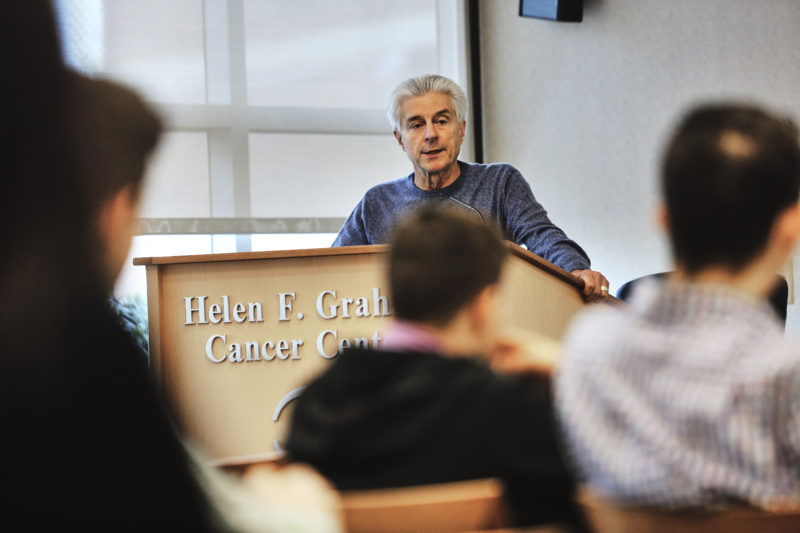
“Progress in cancer care and research can’t be achieved unless the next generation of philanthropic and biomedical leaders steps up to the plate,” said Nicholas Petrelli, M.D., the Cancer Center’s Bank of America endowed medical director. “The Young Friends have the potential to be the next generation of Delawareans to help move that progress forward.”
While teens need not be heading toward a career in health care to be part of the Young Friends, Dr. Kmiec’s talk on gene editing definitely resonated with Emily Coughenor, a Pennsylvania Leadership Charter School student who hopes to pursue a career researching food allergies. It was also interesting for Trixie Moore of Archmere Academy, considering a career in neurosurgery, and timely for Salesianum student Salem Shreve, whose newfound interest in becoming a pathologist after reading a bestseller on the origins of the Ebola virus could land him in a gene editing lab not unlike Dr. Kmiec’s one day.
Whatever their chosen career path, a key piece of advice for the Young Friends was to experience college with a mind open to possibilities and to pursue a career for which they have passion.
“As do most professionals, scientists work all of the time,” Dr. Kmiec said. “This is not a 9-to-5 job, but the rewards are incredible. Whatever you choose to do, if you have passion for your work, you will be happy and successful.”
To encourage the next generation of scientists in Delaware, Dr. Kmiec and his team are using a $1 million National Science Foundation grant to introduce gene editing kits to middle- and high-school science curricula. The grant will allow students to genetically engineer baker’s yeast colonies to isolate and map DNA.
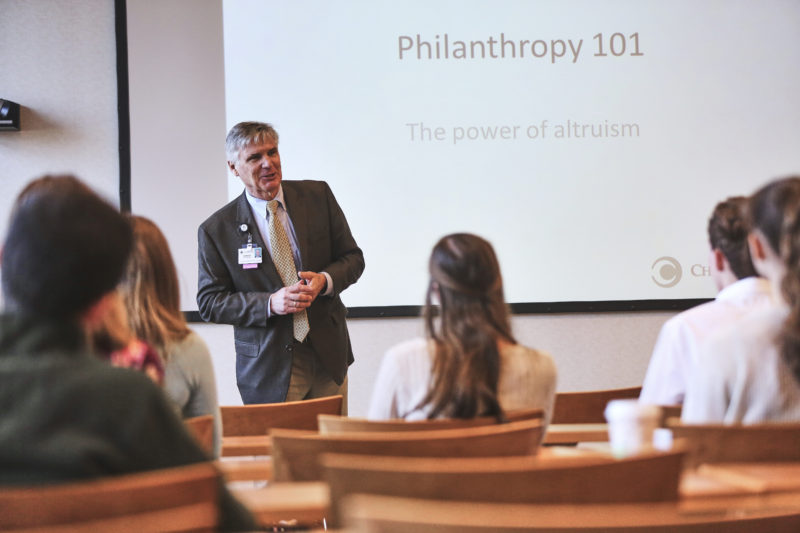
In their first year, the Young Friends coordinated activities raising $15,000 to support Christiana Care’s innovative First State School for chronically ill children, Camp FRESH for Wilmington teens and the Emergency Department Special Needs Fund. Now in their second year, these young philanthropists and leaders in training will embrace a new challenge. They are forming a grant-making committee responsible for reviewing requests from 10 health system programs and determining how $25,000 in funds will be distributed.
Beginning in April, the Young Friends will review submissions and perform site visits, then meet as a group in August to discuss the merits of each request and decide where the money will make the most impact. The group received a lesson in “Philanthropy 101” from Christiana Care’s Vice President for Development Gordon Brownlee.
Co-chairing and guiding the Young Friends are Trustee Chair Penny Saridakis and Trustees Diane du Pont, Margaret O’Dwyer and Beth Moore.
“We expect that this process will be a challenging and rewarding experience for the Young Friends as they work through this unique opportunity to make a measurable impact,” said Moore. “Leadership, community service and philanthropy are important engines in our state and our society.”
